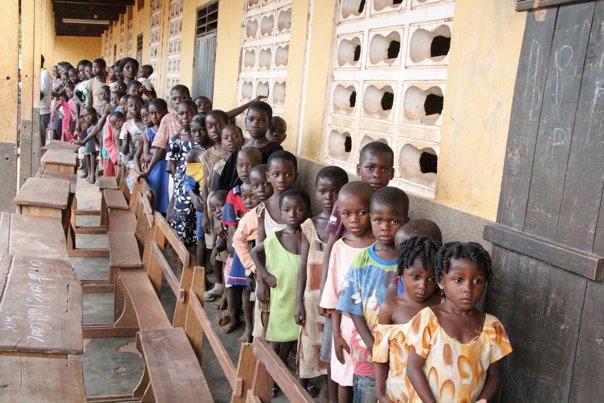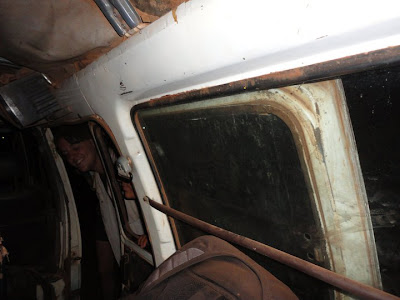I have wanted to write a post describing the role of gender in Ghanaian society, which has proven difficult since I do not fully understand it myself. So I apologize in advance for this long and disjointed entry, and only hope that my readers gain an accurate perspective, and a little more knowledge of the global position of women. I have stumbled upon a number of situations that speak volumes about this issue, and can certainly say that female and male roles are not equal in Ghana. But this is true everywhere.
Women typically play a subordinate role to men in this society. This is seen everywhere: the workplace, home life, even in everyday conversations. Men are, simply put, more powerful than women are. As in virtually every other country, policies and laws are written by men, for men, and those men assume that women will obey.
I have seen that Ghanaian men feel a sense of ownership over women. Not only wives, sisters, and daughters, but also strangers. A man feels entitled to tell a woman what to do, whether he wants her to fetch him food or water, or to go out with him on a date. Certainly, he feels entirely entitled to touch any woman, usually not in an inappropriate place, but often disrespectfully.
(I will note, however, that this does not apply to everyone. Ghana is becoming more and more enlightened when it comes to gender issues, and the country is vastly more advanced than many in the world.)
Meanwhile, Ghanaian women are, unsurprisingly, the backbone of the society. They cook, they clean, they birth and care for children (a responsibility that means more here than it does in America, since the validity of a marriage and the quality of a woman are determined by the number of children they produce). Women deal with their position in society with supreme dignity and strength. They know the challenges they face, and use their wiles to overcome them.
“Ghana is a patriarchal society—our men are in domineering positions, our women in subordinating ones. Men are society’s ‘favorites,’ and we are the ‘others.’”
-Mrs. Naa Owusu, a Ghanaian Social Worker and Guest Lecturer at NYU
*****
My home-stay host brother, Richard, led me into his mother’s house, showing me each of the dimly lit rooms. The house was tidy, and I wondered if this was due to my visit or simply its natural state. We entered through the living room, and were greeted by Richard’s silent little brother. He stood against the back wall, hands wrung together behind his back in nervousness. Next we went to the kitchen, a small room full of shelves of dishes, a small stove, a large tank of water, and a refrigerator. In the center of the room, three Ghanaian women huddled around the stove. When we walked through the doorway they stopped cooking and looked at me.
This is your mother, Richard gestured towards the large woman in the middle, sitting on a stool with a wooden spoon in her hand.
These are your sisters, Efya and Ama. The two younger women were petite and stood next to their mother. The women were dressed in traditional African cloths, draped and tied around their bodies. They had wrapped their hair in cloths, as well. Everything about their outfits seemed to be better suited for the weather than what I was wearing.
This is the kitchen. This is your home, Richard explained.
What? I stared at him.
He smiled. Your home. Women’s homes are in the kitchen. Like these women, he again gestured to his mother and sisters.
Was he serious? My eyes widened and I forced my head to nod.
Next Richard showed me his bedroom, with a large mattress in the center adjacent to a television. There were some miscellaneous items and decorations, and a few pieces of clothing left on the floor. Richard stepped in, looked around, and said, Sorry for the mess. But it’s okay because I’m a man.
Oh, that’s okay. My room looks like this too, I reassured him.
He stared at me. Your room is like this?
Yes… why?
Women should be neat. It is disrespectful for a woman to leave a mess.
Disrespectful? He nodded. Disrespectful towards whom? He laughed.
*****
Down the street from my house is a small shop called First Choice. They sell a variety of items to a clientele of mostly NYU students, since it is conveniently located between the academic center and a student residence house. The woman who runs the store is a stout Ghanaian with a sour expression on her face most of the time. Her employees, a few younger men and women, are mostly kindly and helpful towards customers. One particular employee, Abena, has a round, cheerful face that follows you around the store, eagerly waiting to bag your items. This would be annoying if she didn’t have such a delightful presence.
Yesterday I walked into First Choice with my friend Steven. As we shopped, Abena laughed with us, following us around the store holding black shopping bags. I purchased a box of pineapple juice and a phone card. Steven, among his other selections, asked Abena to bag him some eggs.
Eggs? She laughed.
Steven nodded, a puzzled expression on his face. Eggs.
Abena walked away giggling, and returned with six brown eggs in a small plastic bag. Do you cook? Or is for her? She pointed at me.
Thanks. No, they’re for me. I cook, Steven told her.
Her eyes widened. You cook??
Yes, I cook very well.
Oh, wow!
-----
A man points at me as I am walking into a shop. You! Give me your number!
Excuse me?
Your number! Give it to me! He takes out his phone.
Um, no? I start to walk away.
He grabs my arm and shoves his phone into my hand.
Put your number in!
No, I’m not going to give you my number. I push the phone back to him.
What? Why not?
I stare at him.
It’s nice to be nice!
I shake my head. Why would I be nice to this offensive man? I walk away.
You are not nice woman!
-----
Mary, our seamstress, pokes Natasha with her fingers. She is looking at the dress that my friend is trying on, seeing what adjustments need to be made.
“Do you have a boyfriend?”
Natasha is in somewhat of a complicated relationship, the kind that is so popular in America these days. Low commitment, no specifics or defining of the relationship. The kind that, if you’re in one, you dread the question that Mary asked.
“Eh… well, sort of…”
Mary peers up at Natasha. “You don’t know?”
She laughs nervously. “No, not really! It’s complicated.”
“Then you don’t have a boyfriend.”
“Yeah, I guess so.”
“Don’t worry, he will be yours.” Mary reaches into the front of the dress and adjusts Natasha’s chest.
“No, it’s not that I want him to be mine, he’s just not very good boyfriend material,” she tries to explain.
Marjorie gives Natasha a knowing look. She steps back and ponders the outfit. “There. Now he will be your boyfriend.”
-----
On a local television channel, a Nigerian movie plays. (Incidentally, Nollywood is the third largest film industry in the world, after Hollywood and Bollywood.) The scene is hot, and bright as the sun reflects off of the yellow dirt. A house is set in the sand, made of red-brown mud and twigs. A man sits in front of the house. He is sitting on a low stool, crouched over a bucket of soapy water. He kneads clothing in the bucket, elbow-deep in suds.
My viewing partner, a fifty-something-year-old Ghanaian woman whom I call Nana, guffaws loudly at the sight of him. She looks at me and sees my lack of amusement. Do you know the plot?
I shake my head.
This man lost his job. So his wife makes him do the laundry!
I smile, understanding the joke but not quite seeing the hilarity.
On the TV set, the woman walks up to her husband and barks at him in a local language. He looks at her and responds angrily. She bends down and demonstrates a fast clothes-washing technique. Disgruntled, the man begins to wash faster.
Nana cackles again.
Do you like the show? She asks, glancing at me.
Yes, very much. I do like the movie. Nigerian films are absurd and awesome.
Do you like my house?”
I look at the room and smile. You have a lovely house. How long have you lived here?
My husband bought this house twenty years ago, Nana says.
Nana is unmarried—Your husband?
Yes, and he left the house about ten years ago. He leaves me this house, Nana speaks softly.
I wonder where her financial support comes from—she runs a small grocery stand, from which she sells small kitchen and household items such as palm oil, dish soap, and canned milk. This business does not bring in nearly enough money for her to support herself and her younger sons. Nana’s oldest son works as a computer technician, commuting two hours to Accra daily.
Now my elder son takes care of me.






















































































